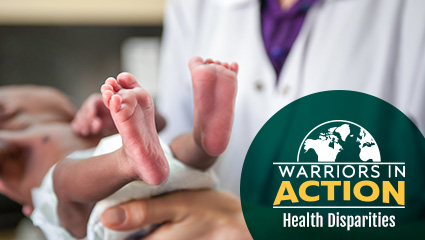Over the coming months, look for videos, stories and events that feature some of the many Wayne State initiatives and passionate individuals committed to eradicating health disparities. This content is part of WSU's Warriors in Action campaign highlighting how Wayne State is making a difference.
Despite advances in health care, research shows that infant mortality rates in African American communities have been approximately twice as high as the rates for whites in the United States for nearly a century. Because preterm births account for the vast majority of infant deaths, it has become increasingly clear that more research on the cause of this problem is needed if infant mortality rates for blacks are to decrease to the level of their white counterparts.
 Leading the National Institutes of Health R01-funded research project “The Impact of Racism on Risk of Preterm Birth in African-American Women,” Dawn Misra, professor and associate chair for research in Department of Family Medicine and Public Health Sciences in Wayne State’s School of Medicine, points out that the gap persists even for black women who are more affluent and better educated.
Leading the National Institutes of Health R01-funded research project “The Impact of Racism on Risk of Preterm Birth in African-American Women,” Dawn Misra, professor and associate chair for research in Department of Family Medicine and Public Health Sciences in Wayne State’s School of Medicine, points out that the gap persists even for black women who are more affluent and better educated.
Misra said a failure to “rigorously and comprehensively” include racism among the factors that contribute to this unbalanced trend has prevented real progress from taking place.
“Whether racism is perceived internally by the individual, has become institutionalized or has led to segregation across entire communities, this exposure is believed to have a profound impact on the birth outcomes for black women,” she said. “It has also been suggested that racism is related to several preterm birth risk factors, such as chronic disease and stress, and effects across generations may be the result of racism in the past.”
While preterm birth rates have fallen for white and black women over the years, rates among black women remain much higher than for whites. “If we are to eliminate the persistent racial disparity in this birth outcome, it is imperative that upstream social risk factors that are amenable to effective intervention be identified,” Misra said. “Overcoming these impediments will require bold and innovative changes in society, as well as the public health and medical care arenas. We view our work as a contribution to an ever-evolving set of ideas.”
Misra values the broad multidisciplinary education she pursued as an undergraduate in a university in a large city, opportunities that she notes are also available at Wayne State. To understand and address health disparities requires learning about social and political systems, knowledge of the history of the United States, particularly with regard to the treatment of minorities, appreciation for the human condition that can be studied in humanities and the arts, and acquiring strong quantitative skills.